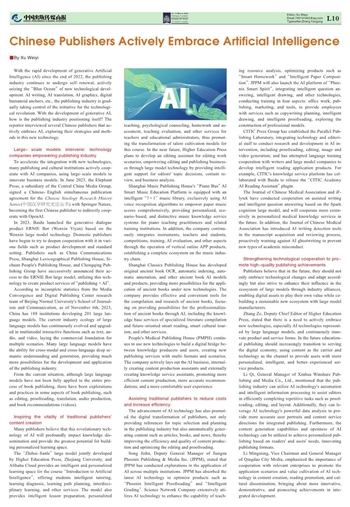■By Xu Weiyi
With the rapid development of generative Artificial Intelligence (AI) since the end of 2022, the publishing industry continues to undergo self-renewal, actively seizing the “Blue Ocean” of new technological development. AI writing, AI translation, AI graphics, digital humanoid anchors, etc., the publishing industry is gradually taking control of the initiative for the technological revolution. With the development of generative AI, how is the publishing industry positioning itself? The reporter interviewed several Chinese publishers that actively embrace AI, exploring their strategies and methods in this new technology.
Large-scale models intervene: technology companies empowering publishing industry
To accelerate the integration with new technologies, many publishing and cultural institutions actively cooperate with AI companies, using large-scale models to innovate business models. In June 2023, the Elephant Press, a subsidiary of the Central China Media Group, signed a Chinese-English simultaneous publication agreement for the Chinese Sinology Research History Series (中国汉学研究史论丛书) with Springer Nature, becoming the first Chinese publisher to indirectly cooperate with OpenAI.
In 2023, Baidu launched the generative dialogue product ERNIE Bot (Wenxin Yiyan) based on the Wenxin large model technology. Domestic publishers have begun to try to deepen cooperation with it in various fields such as product development and standard setting. Publishers such as China Communications Press, Shanghai Lexicographical Publishing House, Sichuan People's Publishing House, and Chongqing Publishing Group have successively announced their access to the ERNIE Bot large model, utilizing this technology to create product services of “publishing + AI”.
According to incomplete statistics from the Media Convergence and Digital Publishing Center research team of Beijing Normal University's School of Journalism and Communication, as of November 6th, 2023, China has 188 institutions developing 201 large language models. The current industry ecology of large language models has continuously evolved and upgraded in multimodal interactive functions such as text, audio, and video, laying the commercial foundation for multiple scenarios. Many large language models have the ability for cross-modal and cross-language deep semantic understanding and generation, providing much more possibilities for the development and application of the publishing industry.
From the current situation, although large language models have not been fully applied to the entire process of book publishing, there have been explorations and practices in some aspects of book publishing, such as editing, proofreading, translation, audio production, and book recommendations (videos).
Inspiring the vitality of traditional publishers' content creation
Many publishers believe that this revolutionary technology of AI will profoundly impact knowledge dissemination and provide the greatest potential for building personalized learning space.
The “Zhihai-Sanle” large model jointly developed by Higher Education Press, Zhejiang University, and Alibaba Cloud provides an intelligent and personalized learning space for the course “Introduction to Artificial Intelligence”, offering students intelligent tutoring, learning diagnosis, learning path planning, interdisciplinary learning, and other services. The model also provides intelligent lesson preparation, personalized teaching, psychological counseling, homework and assessment, teaching evaluation, and other services for teachers and educational administrators, thus promoting the transformation of talent cultivation models for this course. In the near future, Higher Education Press plans to develop an editing assistant for editing work scenarios, empowering editing and publishing businesses through large model technology by providing intelligent support for editors' topic decisions, content review, and business analysis.
Shanghai Music Publishing House's “Piano Bus” AI Smart Music Education Platform is equipped with an intelligent “7+1” music library, exclusively using AI voice recognition algorithms to empower paper music scores comprehensively, providing personalized, scenario-based, and distinctive music knowledge service systems for piano teaching practitioners and related training institutions. In addition, the company continuously integrates instruments, teachers and students, competitions, training, AI evaluation, and other aspects through the operation of vertical online APP products, establishing a complete ecosystem on the music industry chain.
Shanghai Classics Publishing House has developed original ancient book OCR, automatic indexing, automatic annotation, and other ancient book AI models and products, providing more possibilities for the application of ancient books under new technologies. The company provides effective and convenient tools for the compilation and research of ancient books, focusing on providing possibilities for the professionalization of ancient books through AI, including the knowledge base services of specialized literature compilation and future-oriented smart reading, smart cultural tourism, and other services.
People's Medical Publishing House (PMPH) continues to use new technologies to build a digital bridge between knowledge producers and users, creating new publishing services with multi-formats and scenarios. The company actively lays out the AI business, internally creating content production assistants and externally creating knowledge service assistants, promoting more efficient content production, more accurate recommendations, and a more comfortable user experience.
Assisting traditional publishers to reduce costs and increase efficiency
The advancement of AI technology has also promoted the digital transformation of publishers, not only providing references for topic selection and planning in the publishing industry but also automatically generating content such as articles, books, and news, thereby improving the efficiency and quality of content production and optimizing the editing and proofreading.
Song Jishu, Deputy General Manager of Jiangsu Phoenix Publishing & Media Inc. (JPPM), stated that JPPM has conducted explorations in the application of AI across multiple institutions. JPPM has absorbed the latest AI technology to optimize products such as “Phoenix Intelligent Proofreading” and “Intelligent Grading”. Science Network Company extensively utilizes AI technology to enhance the capability of teaching resource analysis, optimizing products such as “Smart Homework” and “Intelligent Paper Composition”. JPPM will also launch the AI platform of “Phoenix Smart Spirit”, integrating intelligent question answering, intelligent drawing, and other technologies, conducting training in four aspects: office work, publishing, marketing, and tools, to provide employees with services such as copywriting planning, intelligent drawing, and intelligent proofreading, exploring the construction of professional models.
CITIC Press Group has established the Parallel Publishing Laboratory, integrating technology and editorial staff to conduct research and development in AI intervention, including proofreading, editing, image and video generation; and has attempted language training cooperation with writers and large model companies to develop intelligent reading application products. For example, CITIC's knowledge service platform has collaborated with Baidu to release the “CITIC Academy AI Reading Assistant” plugin.
The Journal of Chinese Medical Association and iFlytek have conducted cooperation on assisted writing and intelligent question answering based on the Spark cognition large model, and will cooperate more extensively in personalized medical knowledge services in the future. In addition, the Journal of Chinese Medical Association has introduced AI writing detection tools in the manuscript acquisition and reviewing process, proactively warning against AI ghostwriting to prevent new types of academic misconduct.
Strengthening technological cooperation to promote high-quality publishing achievements
Publishers believe that in the future, they should not only embrace technological changes and adapt accordingly but also strive to enhance their influence in the ecosystem of large models through industry alliances, enabling digital assets to play their own value while co-building a sustainable new ecosystem with large model manufacturers.
Zhang Ze, Deputy Chief Editor of Higher Education Press, stated that there is a need to actively embrace new technologies, especially AI technologies represented by large language models, and continuously innovate product and service forms. In the future educational publishing should increasingly transition to serving the digital economy, using content as the carrier and technology as the channel to provide users with more personalized, intelligent, and better-experienced service products.
Li Qi, General Manager of Xinhua Winshare Publishing and Media Co., Ltd., mentioned that the publishing industry can utilize AI technology's automation and intelligent information processing to assist editors in efficiently completing repetitive tasks such as proofreading, editing, and layout. Additionally, they can leverage AI technology's powerful data analysis to provide more accurate user portraits and content service directions for integrated publishing. Furthermore, the content generation capabilities and openness of AI technology can be utilized to achieve personalized publishing based on readers' and users' needs, innovating publishing formats.
Li Mingming, Vice Chairman and General Manager of Qingdao City Media, emphasized the importance of cooperation with relevant enterprises to promote the application scenarios and value cultivation of AI technology in content creation, reading promotion, and cultural dissemination, bringing about more innovative, demonstrative, and pioneering achievements in integrated development.



